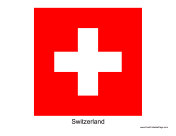
Please note! The volunteers in our Rotary District are always working to add new countries, and monitoring conditions in existing countries. Countries on this list may or may not be available and are subject to change without notice.
Switzerland is a landlocked country situated in Western and Central Europe where it is bordered by Germany to the north, France to the west, Italy to the south, and Austria and Liechtenstein to the east. While the Alps occupy the greater part of the territory, the Swiss population of approximately 8 million people is concentrated mostly on the Plateau, where the largest cities are to be found. Among them are the two global cities and economic centers, Zurich and Geneva.
The Swiss Confederation has a long history of armed neutrality (it has not been in a state of war internationally since 1815) and did not join the United Nations until 2002. It pursues, however, an active foreign policy and is frequently involved in peace-building processes around the world. Switzerland is also the birthplace of the Red Cross and home to a large number of international organizations, including the second largest UN office. On the European level, it is a founding member of the European Free Trade Association although it is notably not a member of the European Union, nor the European Economic Area.
Switzerland is one of the richest countries in the world by per capita gross domestic product, and has the highest wealth per adult (financial and non-financial assets) of any country in the world. Zurich and Geneva have respectively been ranked as the cities with the second and eighth highest quality of life in the world.
Switzerland comprises four main linguistic and cultural regions: German, French, Italian, to which the Romansh-speaking valleys are added. The Swiss, therefore, though predominantly German-speaking, do not form a nation in the sense of a common ethnic or linguistic identity. The strong sense of belonging to the country is founded on the common historical background, shared values (federalism and direct democracy) and Alpine symbolism. The establishment of the Swiss Confederation is traditionally dated to 1 August 1291; Swiss National Day is celebrated on the anniversary.
This text provided by Wikipedia under the terms of the Creative Commons Attribution-ShareAlike License